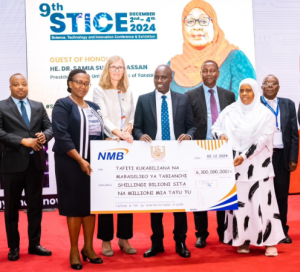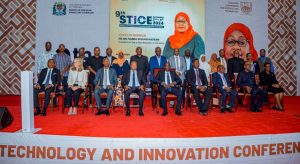
A research team led by Dr. Cyrus Rumisha, a member of the Department of Animal, Aquaculture, and Range Sciences (DAARS), from a College of Agriculture at Sokoine University of Agriculture (SUA) has won a highly competitive climate change research grant funded by the Commission for Science and Technology (COSTECH). The project, titled “Leveraging Digital Alert Systems and Climate-Adapted Fish Strains to Foster Climate-Resilience in Cage-Fish Farming Systems in the Lake Victoria Basin, Tanzania (FISHALERT),” is among the 19 groundbreaking research initiatives selected for funding at the 9th National Science, Technology and Innovation Conference and Exhibitions (STICE).
 The grant award ceremony took place on 2nd December 2024 at the Julius Nyerere International Convention Centre and was officiated by the Deputy Prime Minister of the United Republic of Tanzania, Hon. Dr. Doto Biteko. During the event, the Deputy Prime Minister commended all recipients for their innovative contributions to advancing climate resilience and addressing pressing societal challenges. The recipients were recognized for their exceptional contributions to tackling climate-related impacts while promoting societal well-being. The ceremony highlighted the significance of collective action and partnerships in achieving transformative change, inspiring attendees to continue driving impactful initiatives.
The grant award ceremony took place on 2nd December 2024 at the Julius Nyerere International Convention Centre and was officiated by the Deputy Prime Minister of the United Republic of Tanzania, Hon. Dr. Doto Biteko. During the event, the Deputy Prime Minister commended all recipients for their innovative contributions to advancing climate resilience and addressing pressing societal challenges. The recipients were recognized for their exceptional contributions to tackling climate-related impacts while promoting societal well-being. The ceremony highlighted the significance of collective action and partnerships in achieving transformative change, inspiring attendees to continue driving impactful initiatives.

The FISHALERT project addresses the impacts of climate change on cage fish farming in Lake Victoria. It employs digital systems to provide real-time alerts on critical water quality changes, including temperature fluctuations, reduced dissolved oxygen levels, and the occurrence of harmful algal blooms (HABs). These stressors, intensified by climate variability, pose significant risks to fish health and survival. By enabling timely interventions, FISHALERT aims to reduce fish mortalities and improve the climate resilience of cage-fish farming systems. Furthermore, the project seeks to screen existing tilapia strains for their tolerance to these climate-driven water quality challenges, fostering the development of more robust aquaculture practices.




